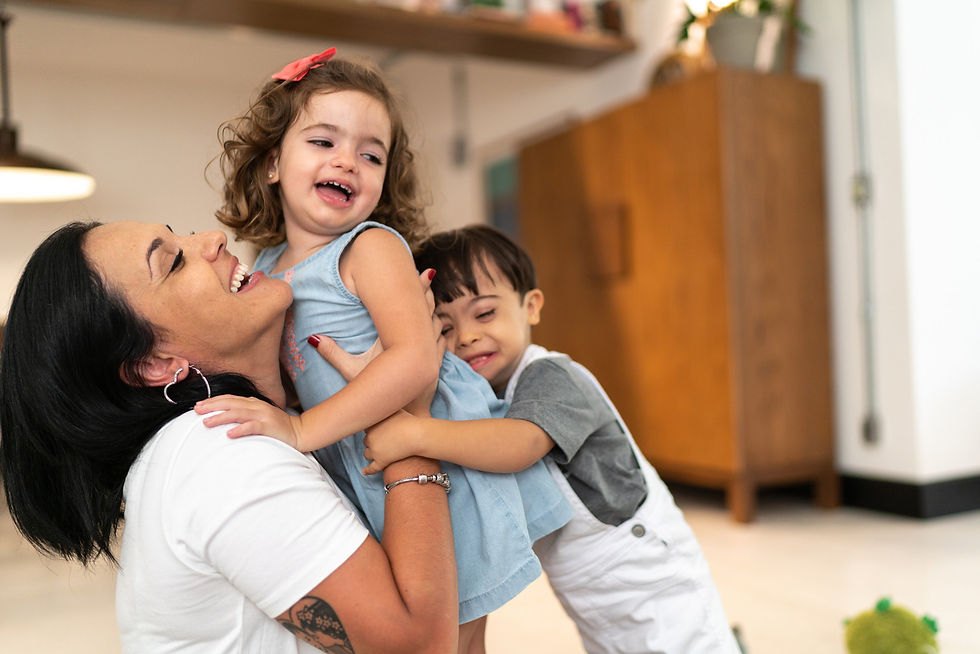Meal-time Masterclass - Get Your Toddlers to Teens Engaged at Dinnertime
- catherinejdietrich
- Nov 22, 2020
- 5 min read
Updated: Nov 24, 2020
For busy parents, dinner time can feel like an uphill battle. When any given Tuesday might involve school runs, board meetings, ballet lessons, homework, soccer practice, and remembering to book the dentist appointments, the prospect of presenting your family with a home-cooked meal at the end of a busy day might seem like just another chore.
It’s easy to wish you could grab dinner on the go, or decompress while your kids eat with a show on in the background. But research has shown that regular and meaningful family meals offer a huge variety of benefits to both children and parents. A research team from Rutgers, the State University of New Jersey in the US, has found that teens who eat at the family table more often are more likely to show fewer signs of depression and feel that their family is more supportive - and this feeling begins in early childhood.
In a world where a third of UK children are eating their evening meal in front of the TV, it seems that surely we can - and should - do better. Family dinner doesn’t have to be fancy, but it can be fun, interactive, and joyful.
Jeanne Munchick, the author of Dinner for Busy Moms, says, “The bottom line is, we need to slow down and show our kids we are listening to them. This not only helps strengthen family bonds but ensures good habits once kids reach those challenging teenage years. By sharing, talking, giving and receiving feedback and suggestions, children gain confidence not only as they tell their stories, but also as they participate in the verbal exchange.”
The team at Good People has put our heads together to come up with some fun and simple ways to help the conversation flow - no matter the age of your children - so that mealtimes become an opportunity to connect, and in doing so create memorable moments that will make home a haven for both our children and ourselves.

International Night
Lindy Claire, mum of three and founder of Good People, has started a fun tradition with her family where, once a month, they pick a country together and make a meal-time fiesta around that theme. “The great thing is you can go as ‘all-out’ as you want to,” she says. “We usually pick the country on Monday for dinner on Thursday. This gives us four full days to discuss, plan, discover and....travel from home (especially handy in 2020). You can have the kids draw the country’s flag as place mats and research music, decorations, and outfits. It’s an opportunity for the whole family to get a bit silly together, and learn something about a different culture at the same time.” It’s also a foolproof way of introducing new foods to children - as if they know the story behind it, they will be more inclined to try new flavours. Lindy keeps a photo album of the “International Night” dinners the family has had over the years - something to look back on and treasure as time flies by.
“My Favourite Mistake”
Jane Dimyan Ehrenfeld, director for the Centre for Inspired Teaching, says that this little game involves taking turns to talk about something each person did wrong during the day and how they tried to fix it. The beauty of this game is in parents taking a turn, because children love learning about how parents fail. “Not only does the exercise demonstrate that parents can make and admit to mistakes,” Ehrenfeld writes, “it also sends the message that ‘you’ve never done anything so terrible you can’t share it with your parents’ - a message I hope will stay strong through their teenage and adult years.”
"This or That"
Younger children especially love to be asked their opinions, and the “this or that” game is a fun and easy way to draw them out. You can start simply, with “Pancakes or waffles?”, and progress to more insightful questions like, “Fame or happiness?” or “Love or money?”. You can get silly with, “Water slide in the garden or slide instead of stairs?” or domestic with, “Toilet paper goes over or under?” - the possibilities are endless. This games keeps families talking as everybody gets to answer, and can lead to spirited disagreements, discussion on serious topics, and plenty of laughs.
Little Presidents - "For or Against?"
As your children sit down to dinner, consider throwing an outrageous question at them, and asking them to make arguments “for” or “against”. Try something like, “All bike riding should be banned for under-18s”, “All children should have cabbage for breakfast in winter”, or “School holidays should be banned for teenagers." The wilder the better. Sit back and watch them formulate their arguments to persuade and dispute, and know you’re setting them up with the tools they’ll need to approach injustices they're sure to meet in their future with consideration, conviction and eloquence.
Be specific - "Sad, Mad, Glad"
Parents of surly teenagers and attention-challenged 7-year-olds alike know that the question, “How was your day?” is likely to be met with a sketchy picture at best and a monosyllabic grunt at worst. Try to be more specific with your questions - the “Sad, Mad, and Glad” game is a good way to start. Go around the table listing what made each of you “sad, mad, or glad” during the course of the day - this is a good opportunity to understand what tensions, stresses or conflicts might be brewing in their lives without waiting for them to tell you about it directly.
Connection is key
Anne Fishel, an Associate Clinical Professor of Psychology at the Harvard Medical School, says, “Dinner table conversation has special qualities that make it different from talk we have at other times such as while carpooling or while tucking kids in at bedtime. Research indicates that, on average, children bring up about six different topics at dinner, so conversation tends to be interesting and varied.
Also, families who eat together expect that children will sit and talk for more than a few minutes and each topic usually gets input from several members, so there are multiple viewpoints expressed. This exposure to multiple points of view engages kids in complex thinking and can encourage tolerance for opinions different from one’s own. Helping kids tell stories that include their thoughts and feelings rather than just the facts is associated with greater well being.”
Dinner time doesn’t have to be fancy - it just needs to be time spent together where phones and other distractions can be put aside and the family can connect and be themselves. Life throws enough pressures our way - don’t let dinnertime be one of them. Instead treat it as the family time you’ve been looking forward to all day - and sit back and be amazed as your children start to do the same.
Good People is a domestic staffing agency specialising in introducing high quality household assistance. We provide a simple, fast and professional service to recruit trained and vetted staff who match your family values. To discuss what we can do for you, or to join the Good People Club, get in touch today.



Comments